
Hannah D’Apice

Before coming to Stanford, I taught professionally for four years in Texas and Singapore, with additional volunteer teaching work in rural parts of Indonesia. My students ranged in age from pre-k to adult, and came from a variety of backgrounds: at-risk youth, vocational students, domestic migrant workers, and internally displaced refugees. In all cases, education served a critical bridge to greater social, economic, and political opportunities for my students and their families. I decided to move from teaching to research and evaluation in education, with the intent of building a career focused on advocating for education policies that serve diverse students and disrupt social inequality.
While looking for graduate programs, I knew I wanted an experience that prioritized rigorous training in theory and methods, while also providing the foundation to flexibly move between academic and policy spheres in the future. Stanford’s IEPA MA program met and exceeded these expectations. Core IEPA coursework provided a comprehensive, interdisciplinary knowledge base with which to think critically about both international education issues and international development more broadly. I had the opportunity to take advanced quantitative and qualitative methods classes alongside doctoral students, both inside and outside of the GSE. Through opportunities provided by the GSE network, I was able to complete an internship with Innovations for Poverty Action, as well as have two research assistantships within Stanford itself. Finally, thanks to the small size of my cohort, I developed close relationships with both my cohort mates as well as with the multiple dedicated ICE/IEPA faculty members.
Most of all, I am grateful to Stanford for providing me with the freedom and support to pursue a diverse array of interests. For my MA Paper, I conducted an analysis of the global diffusion of peace education, and received grant money from the GSE and Freeman Spogli Institute to present my findings at the annual meeting of the Comparative and International Education Society. Through self-directed course projects, I had the opportunity to interview education practitioners based in Indonesia; design a quasi-experimental evaluation of a pre-k policy; write a World Bank-style project appraisal document; and research gender issues in conflict-affected contexts. Stanford’s exceptional faculty were readily available with direct feedback and support throughout.
Since graduation, I have been working full-time as a Research Manager, managing the complete research cycle for randomized controlled trials and quasi-experiments evaluating the impact of education programs. This is the exact sort of work I aspired to when I first left the classroom, and I am extremely grateful to the Stanford IEPA MA program for the personal and professional opportunities it provided.
(As of September 2018, Hannah is a doctoral student in the ICE PhD Program.)
